Topic- computing
Our topic this half term is all about computing.
We’ve starting with ‘offline computing’ – learning all about algorithms.
We are going to be playing, and making, lots of online and offline games. As this is a computing topic, we’ll be using a range of technology including Blue-Bots and iPads.
Here is a lost of some of the vocabulary that will be taught in the coming weeks.
Big Walk and Wheel
Get set… we’re taking part in Sustrans Big Walk and Wheel 2022 (the new name for Big Pedal), the UK’s largest inter-school cycling, walking, wheeling and scooting challenge. The challenge runs from 21 March to 1 April. It’s free and we would love everyone to be involved.
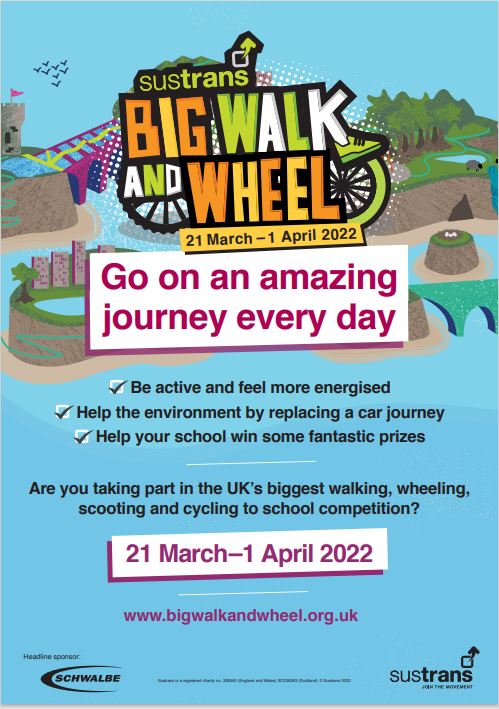
What do you need to do?
Encourage your child(ren) to walk, scoot or cycle to school on as many days as possible during the event. Park and stride (parking your car further away from school, for example, Marks and Spencer car park and walking, scooting or biking the final part of the journey) also counts.
Why we are taking part
As a happy and healthy school, Sustrans Big Walk and Wheel is a great way to build physical activity in children’s daily routine which is important for their physical health and mental wellbeing.
Active school runs also help to reduce congestion and air pollution outside the school gate. A 2021 YouGov study showed nearly half of UK children worry about air pollution near their school. Children thought active travel was the best away to bring down these pollution levels.
Plus there are some great prizes to be won every day if we get enough children taking part!
Useful resources
To help you prepare, Sustrans has developed a handy free guide packed with advice, games and challenges to help you have hassle-free cycle, walk or scoot to school.
Download your free family guide here.
We are gymnasts!
Last Friday, Year 5 completed a series of gymnastic challenges in the hall.
Check out the pictures below to see some graceful gymnasts!






Times tables
Hello!
Hopefully you have already heard about this from your child but if not, Times Table Rock Stars tournaments are back on! Our focus in Year 4 at the moment are times tables. They’re so fundamental in being able to develop in maths.
Year 4 have just beaten Year 6 in the first round, which is amazing, but we need to keep it up to be able to beat Year 3…
Don’t worry, you don’t need to do anything differently but just make sure your child is logging on to TTRS daily and playing as many games as you can to keep us in the lead. Not only is this fun and exciting for the children but it’s going to improve their rapid recall of their times tables which is essential during lesson time.
Bring on the next tournament!
Cross country runners
Well done to pupils who took part in the Leeds Schools Athletics Association Saturday morning race at Middleton Park. These races are open to Key Stage 2 children. This was the final race for the season but we will continue to offer these races next year.
It was great to hear they were encouraging each other at the event. Great work!
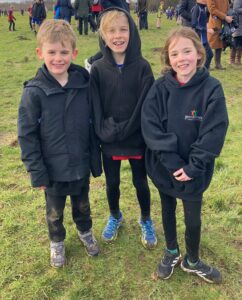
This week in Reception
We had a busy week last week and really enjoyed seeing all of the children’s costumes on World Book Day.

Phonics
We have learnt all the phonemes we need this year and during the next few weeks, we will be practising reading longer words and gaining fluency.
Reading
The children are doing really well with their reading and becoming more fluent and confident. Remember, they will have read their reading practise book four times before it is assigned as an e-book. We are aiming for fluency and your child should not need to blend the words.
I hope you will be impressed with how fluent they are becoming.
Any problems with accessing the e-books, please let me know.

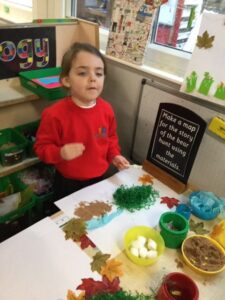
Maths
This week we will continue to look at comparison and using the language of ‘more than’, ‘less than’ and ‘equal to’ to describe the relationships between numbers.
‘Less than’ is used instead of ‘fewer than’ when the focus is on each number’s position in the counting sequence.
Considering equal quantities and equal distribution will prepare the children for the meaning of the equals (=) symbol.

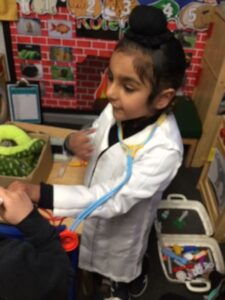

World Book Day
Check out Y5’s costumes for World Book Day! Can you recognise any of the characters?

World Book Day 2022
We had a fantastic day celebrating World Book Day by reading books, talking about our favourite authors and books and dressing up as characters from some of our favourite books.



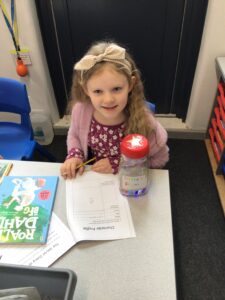


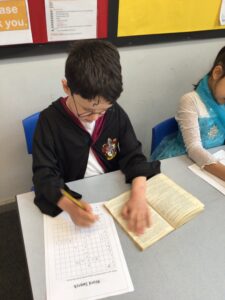
After a morning of completing activities related to their favourite books, the children paired up across Year 1 and 2 to share their work. It was fantastic to see the collaboration, interaction and enthusiasm for books when the children worked together.


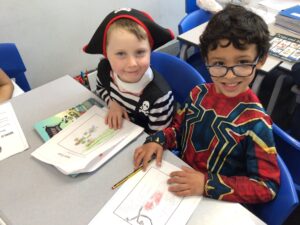





You can find more activities, videos, book recommendations and the brilliant World Book Day song on the World Book Day website.
World Book Day
To celebrate all things books, Y6 had a lovely morning enjoying the library, completing activities related to their favourite books and chilling out and reading.
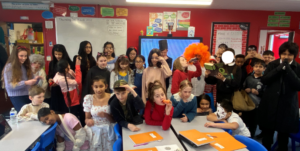

We looked amazing in our costumes and we all took turns to share who we’d come as, which book we were from and who was the author!

Amber from the Midnight Gang takes her mind off her broken arm.

Gangsta Granny is probably researching another jewel heist.

Mr Poe is giving the competition his best shot – good luck!
If you’d like to still enter, bring in £1 and bring your competition sheet back by Friday 11 March.
And finally…

Where’s Wally?
Welcome to Spring 2
We hope you had a great half-term. Let’s hope for a more settled half-term and better weather!
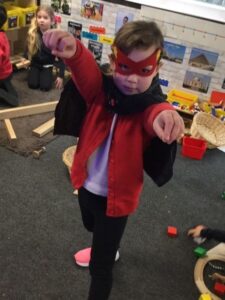
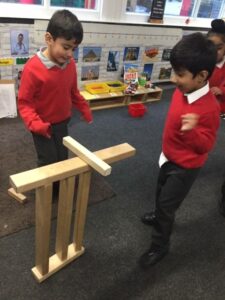

During the next few weeks our theme will be ‘Let’s Go!’. This theme will include the following mini-topics.
Great outdoors
As the weather becomes warmer, children will begin to notice the first signs of spring. Your child will observe the changes in the environment and will observe the bulbs that we planted grow earlier.
This theme is Geography-led. Your child will look at a contrasting locality within the UK. They’ll compare life in a city to life in the countryside by looking at books, photographs and drawing on the children’s own experiences.
On the move
Following on from the Great Outdoors theme, we’ll extend our geographical comparisons to a different part of the world. Your child will look at life in that country and compare it to their own life here in the UK.
The outdoor area will be used to promote your child’s scientific understanding. Your child will plant seeds and care for beans, peas, carrots and potatoes. They will watch them grow and will learn what conditions are needed for plants to grow.
New life
As a scientist, your child will continue to develop their understanding of growth through our incubation project this term. They’ll watch eggs incubate, chicks hatch and develop. They’ll care for the chicks by making sure that they have food and water. From this experience, they will gain early scientific knowledge relating to life cycles.
Easter
Easter is another festival that your child will learn about. We’ll talk about how some families celebrate Easter. Your child will take part in various traditions such as egg decoration, egg rolling and hot cross buns. We’ll share the Easter story. We’ll link Easter to our previous theme of New Life by discussing animals they may see out and about – sheep and their lambs, for example.
Phonics
We will be practising all the phonemes learnt so far and using these to read and write captions and simple sentences.
Literacy
We will read and retell the following texts.
We’re Going on a Bear Hunt by Michael Rosen
The Hundred Decker Bus by Mike Smith
The Tiny Seed by Eric Carle
The Very Hungry Caterpillar by Eric Carle
Maths
The children will continue to develop a deep understanding of numbers to 10, (including the composition of each number).
They will practise their ability to subitise (recognise quantities without counting) up to 5 and verbally count beyond 20, recognising the pattern of the counting system.
Through day to day practical activities they will compare quantities up to 10 in different contexts, recognising when one quantity is greater than, less than or the same as the other quantity.
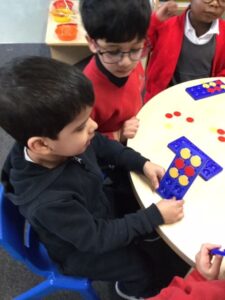
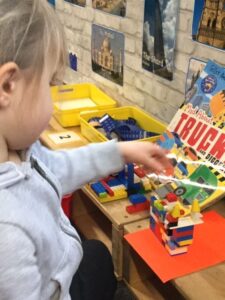
As always, please ask if you have any questions and let us know about your child’s ‘wow moments’ at home.

